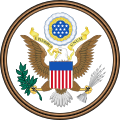Oregon Progressive Party | |
|---|---|
 | |
| Founded | 2007 |
| Headquarters | 320 SW Harvey Milk Street, Suite 202, Portland, OR 97204 |
| Membership | 3,671 registered voters (2024) [1] |
| Ideology | Progressivism Social democracy Environmentalism |
| Political position | Center-left |
| Colors | Green |
| Senate | 0 / 30 |
| House of Representatives | 0 / 60 |
| U.S. Senate | 0 / 2 |
| U.S. House of Representatives | 0 / 5 |
| Statewide Executive Offices | 0 / 5 |
| Website | |
| www | |
The Oregon Progressive Party (OPP) is a progressive political party in Oregon. OPP formed in 2007 as the Oregon Peace Party.
Contents
- History
- Election results
- Presidential elections
- Congressional elections
- Statewide elections
- State legislature elections
- See also
- References
- External links
OPP supports economic justice, environmental justice, and grassroots democracy.
OPP and other state progressive parties in Vermont, California, Minnesota, Washington, and Wisconsin have endorsed national "Progressive Party" candidates for President.

